Le Moyne Announces 2023 Commencement Speaker and Honorary Degree Recipients
Le Moyne College will award five honorary degrees as part of its 73nd commencement ceremonies, taking place the weekend of Friday May 19 to Sunday, May 21. The College’s 2023 commencement speaker will be author, professor and disability rights activist Stephen Kuusisto, who will address students at the College’s undergraduate commencement on Sunday, May 21 at 9:30 a.m. in the Expo Center at the New York State Fairgrounds
In addition to Kuusisto, those receiving honorary degrees at a special ceremony on campus on Saturday, May 20 at noon will be:
- Dr. Leslie Shaw ’62, professor of pathology and laboratory medicine at the University of Pennsylvania and a pioneer in therapeutic drug monitoring.
- Zacharia H. Mohamed ’16, currently enrolled in medical school at Upstate Medical University, who as a young boy escaped a civil war in his native Somalia.
- Jack Podsiadlo, S.J., whose 40-plus year career built the Nativity Network of Schools into a national network dedicated to providing educational opportunities for underserved youth.
- Joyce Suslovic, a history teacher at Henninger High School in Syracuse and an outspoken proponent of social activism and equality.
”I am in awe of the accomplishments of all those who we will honor during this year’s commencement weekend,” said Le Moyne President Linda LeMura. “Every one of them has an inspirational story to tell and truly embody the Jesuit values that we foster at Le Moyne. I am humbled to be part of Le Moyne’s recognition of these outstanding and influential individuals.”
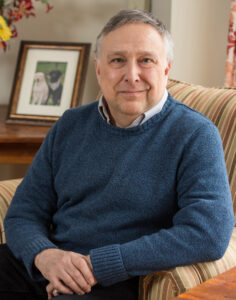
Stephen Kuusisto currently serves as university professor and director of interdisciplinary programs and outreach at the Burton Blatt Institute at Syracuse University, which advances the civic, economic and social participation of people with disabilities around the world. Born legally blind, he is the author of the memoirs Have Dog, Will Travel; Planet of the Blind (a New York Times “Notable Book of the Year”), Eavesdropping: A Memoir of Blindness and Listening and of the poetry collections Only Bread, Only Light and Letters to Borges and Old Horse, What is to Be Done? His daily blog “Planet of the Blind” is read globally by people interested in disability and contemporary culture.
Kuusisto studied as an undergraduate at Hobart and William Smith Colleges where he caught “the poetry bug” and subsequently attended the University of Iowa’s “Writer’s Workshop” studying with poets Marvin Bell and Donald Justice. As a Fulbright scholar in Helsinki he researched Finnish poetry after World War II during a new period of international engagement in Scandinavian writing, much like the burgeoning interest in translation in American poetry during the sixties and seventies. He was also awarded a Guggenheim Foundation Fellowship in poetry for 2021-2022.
A frequent speaker in the U.S. and abroad, he has a broad interest in the history of medicine and illness. He has appeared on numerous television and radio programs including The Oprah Winfrey Show, Dateline, All Things Considered, Morning Edition, Talk of the Nation and Animal Planet. A native of Exeter, N.H. he has also held senior faculty positions at The Ohio State University and The University of Iowa and has served as a U.S. State Department “cultural ambassador” in Turkmenistan, Kazakhstan and Uzbekistan.
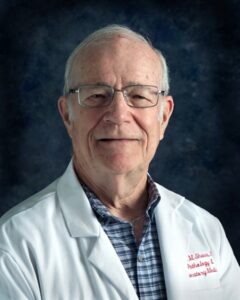 Dr. Leslie Shaw ’62 is professor of pathology and laboratory medicine at the University of Pennsylvania. He has been a pioneer in therapeutic drug monitoring, establishing the toxicology and therapeutic drug monitoring laboratory at the University of Pennsylvania (serving as director since 1977) and participated in several international consensus panels devoted to defining best practices. He has served as president of the International Association of Therapeutic Drug Monitoring and Clinical Toxicology and was the lead editor for the first edition of the text, The Clinical Toxicology Laboratory: Contemporary Practice of Poisoning Evaluation.
Dr. Leslie Shaw ’62 is professor of pathology and laboratory medicine at the University of Pennsylvania. He has been a pioneer in therapeutic drug monitoring, establishing the toxicology and therapeutic drug monitoring laboratory at the University of Pennsylvania (serving as director since 1977) and participated in several international consensus panels devoted to defining best practices. He has served as president of the International Association of Therapeutic Drug Monitoring and Clinical Toxicology and was the lead editor for the first edition of the text, The Clinical Toxicology Laboratory: Contemporary Practice of Poisoning Evaluation.
Dr. Shaw helped develop and is heavily involved in the National Institute of Aging-supported Alzheimer’s Disease Neuroimaging Initiative, one of the world’s largest public-private research partnerships, with more than $140 million in funding from the National Institutes of Health, pharmaceutical companies and foundations. Since 2004, he has served as co-director of the Alzheimer’s Disease Neuroimaging Initiative Biomarker Core Laboratory at Penn and currently serves as an editor for Therapeutic Drug Monitoring, a position he has held since 1991. He has published more than 200 peer-reviewed articles on a wide variety of topics.
Certified in both clinical chemistry and clinical toxicology, Dr. Shaw joined the University of Pennsylvania as an associate in pathology in 1972 and received a series of promotions before becoming a full professor in 1987. He has been a member of the University of Pennsylvania Cancer Center since 1982. Dr. Shaw graduated from Le Moyne in 1962 with a Bachelor’s Degree in chemistry and received his Ph.D. in biochemistry from SUNY Upstate Medical Center in 1968, and completed fellowships at Johns Hopkins University and the University of Pennsylvania Medical Center.
He has received several awards throughout his career, including: the Norman Kubasik Lectureship Award at the Upstate New York American Association for Clinical Chemistry (AACC) Meeting in 1992; the Reinhold Award from the Philadelphia Section of the AACC in 1995; the Peter C. Nowell Teaching Award from the University of Pennsylvania Medical Center in 1999; the IATDMCT Charles Pippenger Award for Outstanding Contributions in Therapeutic Drug Monitoring in 1999; the Kevin Salhany, MD, Award for Excellence in Clinical Teaching from the University of Pennsylvania in 2005; and the Penn Medicine Award of Excellence in 2006. In 2013, Dr. Shaw received the Lifetime Achievement Award from the American Association for Clinical Chemistry (AACC). An active alumnus, in 2012 he was recipient of Le Moyne’s Distinguished Alumnus Award.
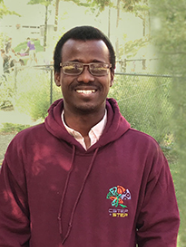 Zacharia H. Mohamed ’16 will graduate from medical school at Upstate Medical University this May and was recently matched for internal medicine at Cooper University Hospital in Camden, N.J., as part of the National Resident Matching Program.
Zacharia H. Mohamed ’16 will graduate from medical school at Upstate Medical University this May and was recently matched for internal medicine at Cooper University Hospital in Camden, N.J., as part of the National Resident Matching Program.
The journey that eventually led Mohamed to medical school began when he was less than a year old when a civil war overtook his village in his native Somalia. In the midst of the chaos, the majority of his family became separated, but his sister, Shukri, then just 10 years old, managed to stay with him. As she was trying to carry him to safety, a bullet struck her. With the aid of two Italian nurses assigned to the conflict zone, she recovered, and the siblings made their way west to Kakuma Refugee Camp in Northwest Kenya, where they remained for the next 10 years. Life in Kakuma was largely about survival, with residents busy making sure they had food, shelter and fresh water. Health care, like education, was a luxury
In 2005, Mohamed, along with his sister and infant nephew, came to the U.S. with the help of the United Nations High Commissioner for Refugees and Catholic Charities. For the first time, he was able to attend school and to learn to read and write. Mohamed thought about what his sister told him about the nurses who came to their aid in Somalia and what he witnessed in Kakuma. He knew how he wanted to leave his mark in the world – by becoming a doctor.
While still a student at Nottingham High School in Syracuse, his sister suffered a brain injury, losing her vision. When his sister was hospitalized and her sons sent to live with someone else, Mohamed was homeless for a while. He finally earned enough money for an apartment, and got his sister and her boys back. With so many responsibilities, he did not initially know if he would be able to attend college. However, with the encouragement of several mentors, he applied to Le Moyne and joined CSTEP. It provided him with friendships and a strong foundation upon which to build his college career. In 2016, Mohamed became the first member of his family to graduate from college when he graduated with a degree in biology.
His long-term goal is to become a family physician and one day to provide care to men, women and children living in refugee camps. For Mohamed, success is not just about personal accomplishment – it is about giving back to others.
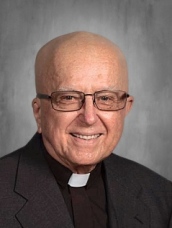 Jack Podsiadlo, S.J., has dedicated more than 40 years to providing educational opportunities for under-served youngsters from economically challenged families who have developed into educated adults, responsible parents, and men and women for others committed to serving the common good. Generations of graduates of Nativity Mission Center, a five-story converted tenement on New York City’s Lower East Side, became the first in their families to graduate high school and college. All try to live their lives by the school’s motto. An opportunity is Nativity’s gift to you. What you do with that opportunity is your gift to Nativity.
Jack Podsiadlo, S.J., has dedicated more than 40 years to providing educational opportunities for under-served youngsters from economically challenged families who have developed into educated adults, responsible parents, and men and women for others committed to serving the common good. Generations of graduates of Nativity Mission Center, a five-story converted tenement on New York City’s Lower East Side, became the first in their families to graduate high school and college. All try to live their lives by the school’s motto. An opportunity is Nativity’s gift to you. What you do with that opportunity is your gift to Nativity.
Father Podsiadlo began teaching at Nativity Mission Center middle school in 1973 and became its principal and executive director in 1984. In the 1990s, Jesuits and religious women in other major cities became aware of the success of the Nativity model and decided, “If they can do it in New York, we can do it also,” and a network of Nativity model schools sprang up across the country.
In 2001, he became the executive director of the Nativity Network of Schools, which merged with the Christian Brothers’ San Miguel Network in 2005 to form the NativityMiguel Network. Today known as NativityMiguel Coalition, this alliance of 50 non-public schools serves students from pre-k through 12th grade in the U.S. and Canada that work together to bring equity to all students through education.
In 2008 Father Podsiadlo returned to New York City to head New York Nativity, the administrative and financial component of the three Jesuit-sponsored middle schools in New York City: Nativity Mission Center, Brooklyn Jesuit Prep and St. Ignatius School in the Bronx. After celebrating Nativity Mission Center’s 40th anniversary in 2012, he relocated to Richmond, Va. to develop and direct the Latino Leadership Institute where recent arrivals from Mexico and Central America are trained to become advocates for the needs of their community.
Presently, Father Podsiadlo serves at McQuaid Jesuit in Rochester, the Jesuit high school from which he graduated in 1958. He serves as a pastoral minister at the school while completing his book titled “The Nativity Phenomenon: A Model That Works.”
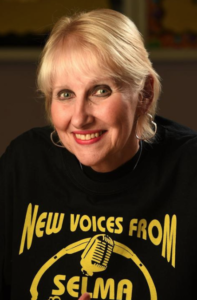 Joyce Suslovic is a retired history teacher from Henninger High School in Syracuse, N.Y., and taught in both rural and urban areas of Central New York for nearly 40 years. Widely known in the Syracuse community as a devoted educator, and outspoken proponent of social activism and equality, Suslovic – referred to by some Miss S or the “first lady” of Henninger – made a tremendous impact on the lived of so many students she worked with over the years.
Joyce Suslovic is a retired history teacher from Henninger High School in Syracuse, N.Y., and taught in both rural and urban areas of Central New York for nearly 40 years. Widely known in the Syracuse community as a devoted educator, and outspoken proponent of social activism and equality, Suslovic – referred to by some Miss S or the “first lady” of Henninger – made a tremendous impact on the lived of so many students she worked with over the years.
Her classrooms often featured non-traditional seating where students faced each other instead of facing the front of the room. She encouraged engagement in many ways, including a lunch club where former students and other adults spoke to students about college and careers and movie nights on Friday nights that not only involved watching a film but also discussion of the historical nature and moral motifs of the work. She spent time tutoring at the North Side Learning Center, organizing and running fundraisers to benefit students and provided connections to On Point for College.
She routinely advocated for students at Syracuse City School District meetings, including an effort in 2016 when she led the “2 Miles is Too Far” group, which pushed the district to bus anyone living more than a mile from school. She has also worked in arts education and programs for students that have behavioral issues. Her calling for fostering the achievement of students from all different kinds backgrounds was a focal point of her work in education.
Her long history of activism started young as she joined the public resistance against the Vietnam War when she was just 17. She is a graduate of University of Massachusetts Lowell, where she majored in education and political science, and she later moved to Syracuse to attend Syracuse University’s Education School, where she graduated with her masters.


